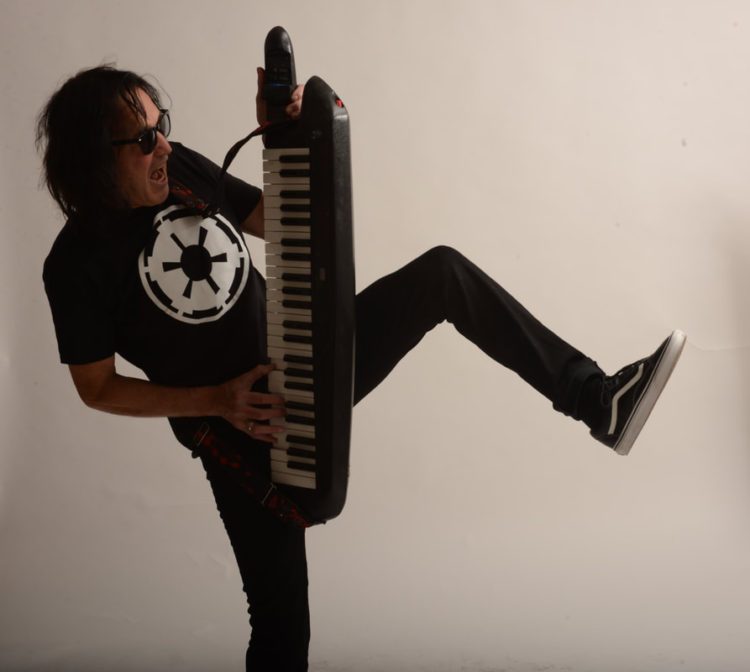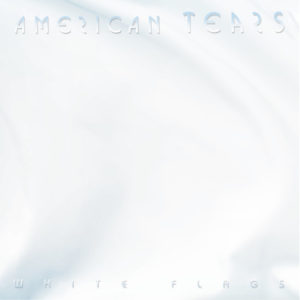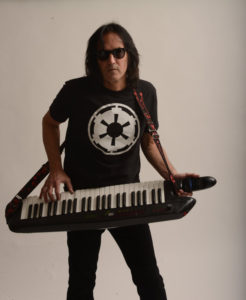
To call Mark Mangold a successful musician and songwriter is a bit of an understatement. Although the subject of this article is the re-emergence of his ground-breaking 1970s keyboard-based progressive rock project American Tears, which recently released its fifth studio album, White Flags, it must be noted that Mangold is responsible or partially responsible for some massive hit songs over the years as a composer in both North America and Europe.
After working with crooner Michael Bolton for a number of years in the 1980s and finding loads of commercial success, Cher recorded the Mangold/Bolton composition I Found Someone, which became a top-10 pop smash. Working with both rock and pop acts from the likes of Paul Rodgers to Jordin Sparks solidified his pop writing credentials but there was always some unfinished business from this American prog-rock pioneer.
Truth be told American Tears could be said to be Mangold’s most inspired and most passionate project. Arising out of the Long Island, New York Music scene in the early 1970s, American Tears was an anomaly on the U.S. music scene, drawing more comparisons to British prog-rock stalwarts such as Yes, King Crimson and Genesis than pretty much anything going on in North America at the time. The original lineup featured the keyboard wizard Mangold alongside bassist Gary Sonny and drummer Tommy Gunn, creating a trio very much in the style of the legendary Emerson, Lake & Palmer, but with a little more of a political edge to their lyrics.
The band produced three critically-acclaimed albums during their heyday: Branded Bad in 1974, Tear Gas in 1975 and Powerhouse in 1977 before splintering. Prior to the end, the band was able to tour extensively, with the likes of Peter Frampton, J. Geils Band, Alvin Lee, Gentle Giant, John McLaughlin and many more.
Besides his work with North American artists such as Bolton and the early 1980s pop rock band Touch, Mangold developed connections in Europe – particularly Scandinavia – and has written or co-written with many hits for domestic acts, splitting his time between New York and Stockholm, Sweden.
“Stockholm is a great music town. There are a lot of wonderful things happening on the scene, so I am here a lot. I have been coming here for about five years and the music scene just keeps getting bigger and better. That’s what first attracted me; it’s like what New York used to be like in the 1970s and 1980s. New York is kind of dead to me in terms of the whole songwriting scene and the networking scene. But Stockholm is alive and full of energy. The writing, production, quality of musicians and singers is awesome. And I don’t know if people know this, but there are a lot of Swedes behind a lot of American music. Swedes and Norwegians like [Sweden’s] Max Martin, who has done stuff for Katy Perry and Taylor Swift. He has written half of the top 10 songs at any given moment,” said Mangold over Skype from Stockholm.
“But rock music is also kicking here. It’s very popular here still, as opposed to in the U.S. where it’s not really as happening. We have big festivals here and a lot of the rock bands are still happening, still producing and still have life. So, I dig it and feel comfortable and inspired every time I come here.”
White Flags, as with the previous record Hard Core, was written and recorded entirely by Mangold, using both his home studios in New York and Stockholm. He also performed all instruments and sang on each track.
“And I have been on such a roll that I pretty much have the next album nearly finished as well. I don’t know why, but I think I am obsessed with American Tears again and that kind of music. It’s fun and it’s accessible and not as hard to do as it used to be. Of course, in the old days, when American Tears first started, you used to go into a major studio to record a Hammond organ or whatever, and mic up all the gear and spend thousands and thousands of dollars and it would take forever,” he said.

“And now all that stuff is on a Mac, which has great sounds, great plug-ins and it’s much easier to record. So, you can really get to the creativity pretty quick. I guess it’s safe to say I am obsessed with music and I do it every day. I love it, and if I come up with an idea, I don’t have to wait six months to book a studio. I can just go into my own place and do it. I keep noodling all the time. On top of American Tears, I am doing other stuff, including working on another Touch record at the moment. I finally got those guys together after years and years and we’re having some fun doing that. And I also write pop music which, in my case is almost a reaction to the bullshit, straight formulas of modern pop. So, it’s really refreshing for me to step away from all the pop stuff and do these progressive songs.
“It’s great with this American Tears music to not have to consult a formula or go according to any sort of preconceived plan. I just do it with the creativity I have in me and follow what my instincts are and what I want the song to be in that particular moment. It is more challenging, I would say, because there is a certain security in that pop formula, whereas I am always going out on a limb doing the American Tears stuff. I am flexing muscles I don’t always get to use. I mean, when was the last time you heard a synth solo. Where has that gone? I love that kind of stuff, because that’s where I come from. The Hammond organ is what I earned my chops on. I love those sorts of sounds, so it’s good to be able to get back and express that because, since I don’t play guitar, the keyboards are my main mode of expression.”
The last two albums were also written with a combination of old school sounds and instrumentation, combined with the best of modern digital recording and engineering capabilities.
“It’s cool to hear a lot of these sounds coming back into a lot of new music. And for most young musicians and songwriters, it’s all new to them. You can go into a music store now and you will see something like the old Mini-Moog, which I have sitting right in front of me on my own keyboard stand, and this vintage stuff has an appeal to a lot of these younger guys, which I think is so cool. I was talking to a young person the other day and they asked me about what they thought was a guitar solo on one of my songs and I said, ‘no man, it’s on a synthesizer.’ And he was like, ‘what’s a synthesizer.’ I think they are coming back and you’re likely to hear more synths on a pop song these days. I think it’s wonderful and I love those instruments and I love those sounds,” Mangold said.
“I did employ some new things – I sort of sneaked them in, some more modern sounds. And I even did some David Guetta dance-y kind of sounds made it in there. But I didn’t want to get carried away. Ultimately, I just love that refreshing sound of the old gear and the old instrumentation and the way I can use it to make the music for American Tears. And I hope it inspires other people to make the kind of music that they really want to make.
“For myself, I was doing it kind of in solitude not knowing if anyone would even listen to it and, in a way, being very self indulgent. I just had to get it out. And I am just so gratified that people like it and are digging nine minute songs like Fire Down Below. Oh my God that’s so wonderful. It gives me licence to do 10 minutes songs now. I think people get a chance to be more creative doing it this way as opposed to sticking with the formulas and it’s really nice to know what artists are thinking and how creative they can be without having any limitations. Which is more like how it was in the 1960s and 1970s – those years that give birth to all these bands that we still worship like Yes, Deep Purple, Led Zeppelin, Jethro Tull, ELP et cetera. Nowadays you don’t have to wait for the big studio and that budget from a record company as we used to. So, I think there are more opportunities out there, it’s a great time to be a keyboard player and artist in general in many ways.”
In 2018, Mangold revived the American Tears banner, but wrote and recorded all the music solo, for the aforementioned bold and beautifully produced album Hard Core. What set that album, as well as it’s follow-up, White Flags apart is that every bit of music was written and performed by Mangold, as he allowed his creative music full flight.
The overall theme and tone of White Flags is the idea of surrender – but not in the sense of knuckling under to the slings and arrows of modern life and the pressures, stresses and drama it entails.
 “In many ways, especially politically, in the world the feeling is kind of the same as what was going on in the 1970s when American Tears was first around. And everything kind of converged into feeling like I should do another American Tears record, and for me, in a way, it’s a way to vent because I don’t know if you’ve noticed but there’s a bit of anger on this record lyrically, and there’s an aggression there. I needed way to get it out of me, because it is reminiscent of those days – Vietnam, Watergate, Nixon, this anti-authoritarian stuff that is like the revolutionary feeling that was in the air those days I think is back with us now. It boggles my mind that we’re there again, but we are, and it put me in mind of what I was doing for most of the 1970s, which was this band,” said Mangold.
“In many ways, especially politically, in the world the feeling is kind of the same as what was going on in the 1970s when American Tears was first around. And everything kind of converged into feeling like I should do another American Tears record, and for me, in a way, it’s a way to vent because I don’t know if you’ve noticed but there’s a bit of anger on this record lyrically, and there’s an aggression there. I needed way to get it out of me, because it is reminiscent of those days – Vietnam, Watergate, Nixon, this anti-authoritarian stuff that is like the revolutionary feeling that was in the air those days I think is back with us now. It boggles my mind that we’re there again, but we are, and it put me in mind of what I was doing for most of the 1970s, which was this band,” said Mangold.
“Some of the songs are departures. White Flags is really about surrender – to yourself and to other people. I am really asking what are we fighting for? Send up a white flag. It’s not only to other people to but it’s also about accepting yourself, because we all have our demons and we are all sinners. You can’t accept other people unless you accept yourself. Accept who you are and make peace with it, in a good way. Again, it’s about questioning what you’re fighting for.
“The song Pitch Black is of course about the hear of Donald Trump. Fire Down Below is about a lot of things. It’s about this fire of survival that we all have within us that keeps us going when times are tough. To some people it can also mean the fire of anger. I think every verse in that song is about a different interpretation of that phrase. Some of it is about going out and partying and other parts are about maybe death and anger and, again, that survival instinct that will keep us striving and breathing and fighting and being human, really.”
One of the strongest tracks is the cinematic and lushly produced Wake Up City, which again is a clarion call to action in an age of upheaval, dissention and division.
“It’s saying, ‘wake up, open your eyes; just look around and see what’s going on.’ I stumbled over that lyric and it fit the track I was working on. Sometimes these tracks just happen, and I have to figure out later what to sing in them. It’s not like I am sitting down at a piano and writing the whole song. Quite often I will come up with a beat and just play something over it and figure out what I’ve got to do next, and then figure out what comes after that, and after that and then figure out where the vocals should go, because some of the songs I think work as instrumentals as well. But I do ultimately believe they need lyrics and have something to say,” Mangold explained.
At present, with two new albums out and more new original music on the way, Mangold is anxious to get out on the road and perform these new American Tears songs for audiences on both sides of the Atlantic. So that means bringing in musicians to accompany him on keys and lead vocals. He believes he has the magic triumvirate completed with the addition of former Yngwie Malmsteen, Michael Schenker and Uli Jon Roth bassist Barry Sparks and current Kamelot drummer Alex Landenburg.
“American Tears was always about virtuosity and having great players and bass solos, drum solos and keyboard solos. I think we’re going to start off filming some videos and then see what sort of offers we get for touring and try to get some gigs and festivals over here in Europe. And on the next record, I will use those guys as well, which will add a great dimension to the music,” he said.
For more information on Mangold and American Tears, visit http://www.escape-music.com/ESM331.htm or https://www.facebook.com/American-Tears-1687014304776158.
- Jim Barber is a veteran award-winning journalist and author based in Napanee, ON, who has been writing about music and musicians for a quarter of a century. Besides his journalistic endeavours, he now works as a communications and marketing specialist. Contact him at jimbarberwritingservices@gmail.com.
SHARE THIS POST:
